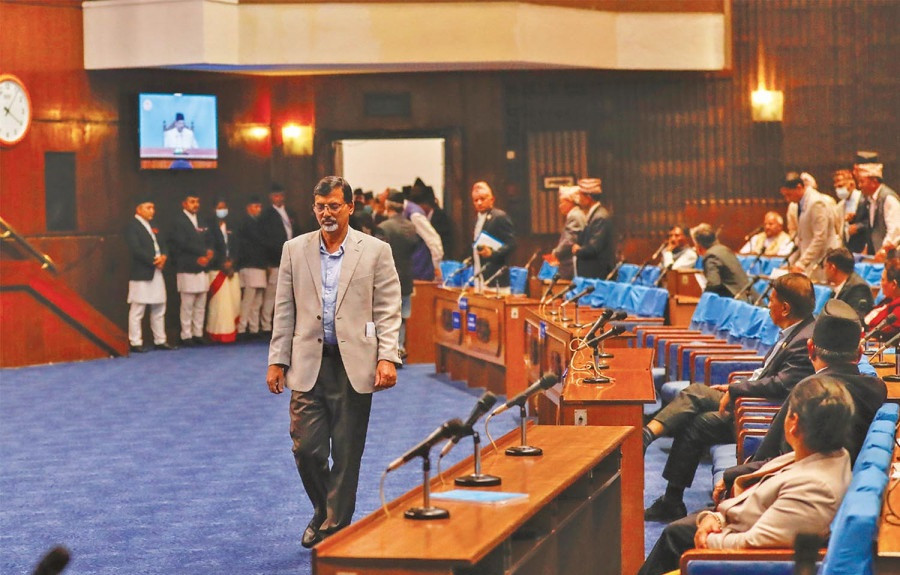Columns
Wishy-washy parliamentary committees
Many crucial bills died because the House of Representatives dawdled until the expiry of its term.
Khim Lal Devkota
The new House of Representatives has another important task to perform after electing the speaker and deputy speaker, and that is choosing the chairpersons of the various parliamentary committees.
The committees play an active role in keeping the executive within the limits of the constitution. They also speak up on matters of public concern, monitor the government's performance and enhance accountability and transparency. The parliamentary panels oversee the performances of different ministries and other government agencies.
There are 10 committees in the House of Representatives, and four in the National Assembly. The 10 lower house panels are 1. Finance, 2. International Relations, 3. Industry, Commerce, Labour and Consumer Rights, 4. Law, Justice and Human Rights, 5. Agriculture, Cooperative and Natural Resources, 6. Women and Social, 7. State Affairs and Good Governance, 8. Development and Technology, 9. Education and Health, and 10. Public Accounts. The four upper house panels are 1. Sustainable Development and Good Governance, 2. Legislation Management, 3. Delegated Management and Government Assurance, and 4. National Affairs and Coordination.
Inactive committees
There are also two joint committees. The Parliamentary Hearings Committee conducts hearings before ratifying the appointment of the chief justice, judges of the Supreme Court, members of the Judicial Council, heads or office bearers of the constitutional bodies and ambassadors. The State Direction, Principle Rules and Responsibility Committee monitors and evaluates the implementation of the state’s guiding principles, policies and responsibilities mentioned in the constitution.
There are many committees in both Houses of Parliament, but most of them have not been able to perform their tasks as expected. As per a report released by the Parliamentary Secretariat last February, only 15 to 25 percent of the directives given by the committees have been implemented.
Last week, the National Affairs and Coordination Committee of the National Assembly noted at its meeting that its decisions and instructions had repeatedly been disregarded. Almost all parliamentary committees have the same complaint.
A report of the Parliamentary Special Committee on the Implementation of Federalism has recommended that the government create an action plan and implement the directives of the parliamentary committees. Not only the instructions of the parliamentary committees, but the recommendations of the constitutional commissions too are being ignored.
In order to improve fiscal discipline and governance and prevent corruption, it is necessary to implement the recommendations of the constitutional commissions by forming an annual calendar.
Besides the non-implementation of the decisions of the parliamentary panels, another problem is that the committees themselves have not been able to meet regularly. Some committees have piles of pending bills that they have not discussed. Proposed legislation related to banks and financial institutions, securities and Nepal Rastra Bank have been gathering dust at the Finance Committee since 2019.
Five bills that originated in the National Assembly and were sent to the House of Representatives have become inactive as the lower house dillydallied until its term expired. The Nepal Media Council Bill, Nepal Special Service Authority Bill, Policy Research Institute Bill, Nepal Civil Aviation Authority Bill and Nepal Air Service Authority Bill died because the parliamentarians wasted time instead of working.
No time to legislate
In addition to these crucial bills, 21 other bills registered in the House of Representatives, some of them dating from 2018, have expired. The dead bills are related to maintenance of peace and security, information technology, construction and development of national priority projects, and the National Security Council.
The more active Parliament and its committees are, the more the government's accountability increases. Service delivery to the citizens also improves.
Complaints have also surfaced that the parliamentary committees have not been able to work as actively as expected because they had weak chairpersons and the government did not implement their instructions. Therefore, special attention needs to be given to the election of committee chairpersons in the new House of Representatives.
Members of Parliament spend more time handling public complaints than discussing legislation. Due to their greed for ministerial positions and other plum appointments, and the need to placate power centres and visit their constituencies frequently, they have little time for drafting laws. In such a situation, it is necessary to make the National Assembly more responsible in the matter of law-making.




 11.12°C Kathmandu
11.12°C Kathmandu















